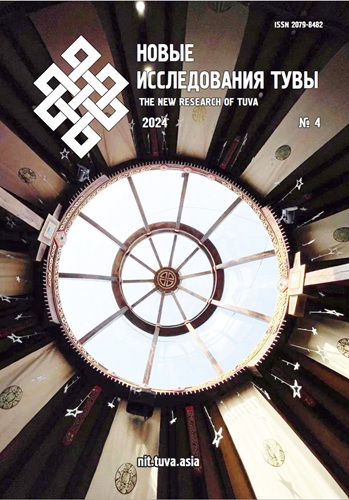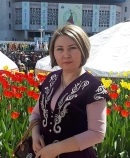Modern studies of the Tuvan family: problem-thematic and methodological analysis
DOI:
https://doi.org/10.25178/nit.2024.4.16Keywords:
Republic of Tuva; Tuvans; family; Tuvan family; family type; review; demographyAbstract
The article provides a review and systematization of scientific publications on marriage and family issues in Tuva, published from 2000 to the present. It presents a distribution of academic works by year, research institutions (author affiliations), types, fields of study, and thematic research directions (historical-ethnographic, ethnopedagogical, gender studies, structural-demographic studies, studies on child socialization in various family types, and others).
A significant increase in the number of publications has been observed since 2016, peaking in 2020. This trend is explained by the growing research interest in marriage and family issues, the introduction of new methods for studying families, and the organization of scientific conferences that stimulate publication activity. Among research and educational centers, the highest number of works was prepared at Tuvan State University, the Tuvan Institute of Humanities and Applied Socio-Economic Research under the Government of the Republic of Tuva, and the Institute of Philosophy and Law of the Siberian Branch of the Russian Academy of Sciences.
The majority of publications are articles in scientific journals and conference proceedings, with only four monographs published over the period under consideration. Most publications are in the fields of ethnography, pedagogy (ethnopedagogy), and sociology. Comparative studies, which allow transformations to be viewed in the mirror of indicators from other Russian regions and ethnonational communities, are also of considerable scientific value.
While noting the positive achievements and the promise of continued research, the authors highlight certain methodological shortcomings in the published results.
References
Alekseeva, A. G. (2018) Family and marriage relations among the indigenous peoples of Siberia: a modern aspect. Missiia konfessii, vol. 7, no. 6 (33), pp. 686–694. (In Russ.).
Alekseenko, T. V. and Davaa Ch. O. (2020) Comparative study of the internality of the personality of adult Tuvans and Russians (in the context of family emotional communication). Problemy sovremennogo obrazovaniia, no. 1, pp. 212–222. (In Russ.). DOI: https://doi.org/10.31862/2218-8711-2020-1-212-222
Biche-ool, S. M. (2018) Traditional marriage and family relations among Tuvans and their transformation in the Soviet period. Abakan, Zhurnalist. 128 p. (In Russ.).
Burkhanova, F. B. (2022) Confidence in the future among the Bashkirs and Tuvans as an indicator of human development: Correlation with family status. New Research of Tuva, no. 3, pp. 208-225 (In Russ.). DOI: https://doi.org/10.25178/nit.2022.3.14
Burkhanova, F. B. and Asadullina, G. R. (2022) Conditions and factors of life of families with children among Bashkirs and Tuvans (experience of sociological analysis). Research Result. Sociology and management, vol. 8, no. 4, pp. 31–46. (In Russ.). DOI: https://doi.org/10.18413/2408-9338-2022-8-4-0-4
Goncharova, G. S. (2003) The values of family and marriage relations in modern conditions among the peoples of Tuva and Khakassia. In: Ethnosocial processes in Siberia. Vol. 5. Proceedings of the VI International seminar on September 13–15, 2001, Ulan-Ude / ed. by Yu. V. Popkov. Novosibirsk, Publishing house of Novosibirsk National Research University. 266 p. Pp. 58–69. (In Russ.).
Goncharova, G. S. and Savel'ev, L. Ya. (2002) Structural characteristics of families. Novosibirsk, Publishing house of the Institute of Philosophy and Law SB RAS. 86 p. (In Russ.).
Goncharova, G. S. and Savel'ev, L. Ya. (2004) Family and marriage relations among the peoples of Siberia: problems, trends, prospects. Novosibirsk, Nonparel'. 288 p. (In Russ.).
Dorzhu, Z. Yu. (2011) The Tuvan family: trends in its life. Omskii nauchnyi vestnik, no. 1 (195), pp. 35–38. (In Russ.).
Dorzhu, M. D. (2016) On strengthening the role of the male father in the Tuvan family. Filologicheskie nauki. Voprosy teorii i praktiki, no. 12–1, pp. 201–203. (In Russ.).
Dorzhu, M. D. (2018) The relevance of fostering kindness and mutual assistance in children in modern Tuvan families. Mir obrazovaniia — Obrazovanie v mire, no. 3 (71), pp. 39–44. (In Russ.).
Dulov, V. I. (1956) Socio-economic history of Tuva. XIX — early XX century. Moscow, AN SSSR Publ. 606 p. (In Russ.).
Irgit, Ch. D. (2019) Features of moral education of children in a Tuvan family. Alleia nauki, vol. 2, no. 6 (33), pp. 161–165. (In Russ.).
Kuzhuget, A. K. (2019) The Tuvan family: traditions and transformation. Scientific notes of the TSPI. Issue XXII. Kyzyl, Anyiak. 451 p. Pp. 240–253. (In Russ.).
Kuular, S. V. (2019) The value orientations of the Tuvan family as a pedagogical problem. Vestnik Tuvinskogo gosudarstvennogo universiteta, issue 4, Pedagogicheskie nauki, no. 2 (47), pp. 11–17. (In Russ.).
Kuular, S. V. (2020a) Research of ideas about family values among Tuvan youth. Vestnik Tuvinskogo gosudarstvennogo universiteta, issue 4, Pedagogicheskie nauki, no. 1 (59), pp. 6–13. (In Russ.).
Kuular, S. V. (2020b) Family traditions as a means of spiritual and moral education among the Tuvan people. Vestnik Tuvinskogo gosudarstvennogo universiteta, issue 4, Pedagogicheskie nauki, no. 4 (71), pp. 55–62. (In Russ.).
Kuular, S. V. (2020c) The value priorities of the modern Tuvan family. Research experience. Mir nauki, kul'tury, obrazovaniia, no. 6 (85), pp. 40–42. (In Russ.). DOI: https://doi.org/10.24412/1991-5500-2020-685-40-42
Lamazhaa, Ch. K. (2021) Tuvans’ Views on Children: Changes of the Attitudes in Socio-cultural Transformations. New Research of Tuva, no. 4, pp. 57–5. (In Russ.). DOI: https://doi.org/10.25178/nit.2021.4.5
Lamazhaa, Ch. K. and Mainy, Sh. B. (2020) Tuvan Wedding Rites: from Establishment of Family Ties to Social Presentation. Oriental Studies, vol. 13, no. 2, pp. 405–421. (In Russ.). DOI: https://doi.org/10.22162/2619-0990-2020-48-2-405-421
Mainy, Sh. B. (2021) Family Rite of khylbyk doy of Urban Tuvans. New Research of Tuva, no. 4, pp. 76–88. (In Russ.). DOI: https://doi.org/10.25178/nit.2021.4.6
Mainy, Sh. B. and Lamazhaa, Ch. K. (2022) Ergindi: Tuvan Tradition of Sharing Children’s Clothing and Things Reviewed. Oriental Studies, vol. 15, no. 5, pp. 1050–1063. (In Russ.). DOI: https://doi.org/10.22162/2619-0990-2022-63-5-1050-1063
Natsak, O. D. (2021) Gender Asymmetries of Modern Tuvan Family Revisited. Biulleten' Kalmytskogo nauchnogo tsentra RAN, no. 2, pp. 120–143. (In Russ.). DOI: https://doi.org/10.22162/2587-6503-2021-2-18-120-143
Natsak, O. D. (2022a) Gender division of domestic work in Tuvan families. Vektory blagopoluchiia: ekonomika i sotsium, no. 1 (44), pp. 79–90. (In Russ.). DOI: https://doi.org/10.18799/26584956/2022/1/1144
Natsak, O. D. (2022b) The distribution of gender-based authority in the modern Tuvan family. Teoriia i praktika obshchestvennogo razvitiia, no. 2, pp. 28–36. (In Russ.). DOI: https://doi.org/10.24158/tipor.2022.2.3
Natsak, O. D. (2022c) Transformation of the Reproductive Model of the Tuvan Family: Historical Retrospective and Current Trends. Sotsiologicheskaia nauka i sotsial'naia praktika, vol. 10, no. 2, pp. 52–71. (In Russ.). DOI: https://doi.org/10.19181/snsp.2022.10.2.9028
Natsak, O. D. (2023) Single-parent families and single-parent practices of women in modern Tuvan society. Abakan, V. M. Torosov Khakass Book Publishing House. 240 p. (In Russ.).
Ondar, L. M. and Ondar, A.-A. A. (2016) Approaches to the study of the Tuvan family in Tuvan studies. Sovremennye naukoemkie tekhnologii, no. 7–1, pp. 177–180. (In Russ.).
Oorzhak, A. A. (2010) Problems of spiritual and moral education of preschoolers in a Tuvan family. Vestnik Tuvinskogo gosudarstvennogo universiteta, issue № 4, Pedagogicheskie nauki, no. 4 (7), pp. 34–37. (In Russ.).
Essays on the social development of the Tuvan ASSR (1983) / ed. by Yu. L. Aranchyn. Novosibirsk, SB AS SSSR Publ. 262 p. (In Russ.).
Potapov, L. P. (1969) Essays on the everyday life of Tuvans. Moscow, Nauka. 402 p. (In Russ.).
Potapov, L. P. (1960) New materials on the ethnography of Tuvans. In: The scientific notes of TNIIIaLI. Issue VIII. Kyzyl, Printing office of the Department of Culture. 311 p. Pp. 180–192. (In Russ.).
Rostovskaia, T. K., Zolotareva, O. A., Vasil'eva, E. N. and Nakisbaev, D. V. (2024) Student family through the eyes of Tuvan youth. New Research of Tuva, no. 2, pp. 225–242. (In Russ.). DOI: https://doi.org/10.25178/nit.2024.2.14
Rostovskaia, T. K., Natsak, O. D. and Elamanova, A. S. (2024) Single-parent families in Tuva and Kazakhstan: a statistical and demographic view of the problem. New Research of Tuva, no. 2, pp. 243–262. (In Russ.). DOI: https://doi.org/10.25178/nit.2024.2.15
Salchak, A. M. (2020a) Features of the father's image in teenagers from single-parent families. Vestnik Tuvinskogo gosudarstvennogo universiteta, issue 4, Pedagogicheskie nauki, no. 2 (63), pp. 32–41. (In Russ.).
Salchak, A. M. (2020b) Peculiarities of the image of the father of younger teenagers in the Republic of Tuva. Chelovecheskii kapital, no. 9 (141), pp. 232–243. (In Russ.). DOI: https://doi.org/10.25629/HC.2020.09.21
Samba, A. D.-B., Goliusova, Yu. V., Demidov, A. A., Anan'eva, K. I. and Ondar N. D. (2024) Sociological portrait of the single-parent family in the Republic of Tuva. New Research of Tuva, no. 1, pp. 184–196. (In Russ.). DOI: https://doi.org/10.25178/nit.2024.1.12
Saryg-Lama, S. O. (2018) The revival of family traditions is the basis for the spiritual and moral education of schoolchildren. Mir nauki, kul'tury, obrazovaniia, no. 3 (70), pp. 129–132. (In Russ.).
Seden, A. V. (2012) Gender differences in the ideas of Tuvan youth about family and marriage. Vestnik Tuvinskogo gosudarstvennogo universiteta, no. 1, pp. 54–57. (In Russ.).
Semenova, Ia. V., Morudenko, Iu. I. and Khortova, M. V. (2020) Introducing younger schoolchildren to family values based on the traditions of family education of the peoples of Yenisei Siberia. Voprosy pedagogiki, no. 10–2, pp. 189–193. (In Russ.).
Sociological characteristics of the urban population of the Tuvan ASSR (1982) / ed. by V. I. Boiko. Novosibirsk, Nauka, Sibirskoe otdelenie. 240 p. (In Russ.).
Subbotin, S. S. (2016) The Tuvan Family and its Functions. Traditions and Innovations. Oriental Studies, vol. 9, no. 6, pp. 159–171. (In Russ.). DOI: https://doi.org/10.22162/2075-7794-2016-28-6-159-171
Sultanbaeva, K. I. (2016) The experience of researching ethnocultural traditions in a modern Tuvan family. Vestnik Tuvinskogo gosudarstvennogo universiteta, issue 4, Pedagogicheskie nauki, no. 4–31, pp. 25–30. (In Russ.).
Tadysheva, N. O. (2021) Modern wedding rituals of the Sayan Altai Turks. Vestnik Tomskogo gosudarstvennogo universiteta, Istoriia, no. 69, pp. 120–125. (In Russ.). DOI: https://doi.org/10.17223/19988613/69/18
Tarbastaeva, I. S. (2010) The Tuvan family: traditions and modernity. New Research of Tuva, no. 2, pp. 259–267. (In Russ.).
Tatarintseva, M. P. (2017) Family and family education among Russian immigrants in Tuva in the first decades of the twentieth century. In: Scientific notes of TIGI. Issue XXIV. Kyzyl, Soembo printing. 584 p. Pp. 408–421. (In Russ.).
Tinikova, E. E. (2019) Marriage and divorce rates among the population of Southern Siberia in the middle of the XX – beginning of the XXI century. Genesis: Historical research, no. 9, pp. 81–92. (In Russ.). DOI: https://doi.org/10.25136/2409-868X.2019.9.30599
Troshkina, I. N., Oidup, T. M. and Dilekova, S. D. (2024) Family values of the population of the republics of Southern Siberia in the estimates of the Altaians, Tuvans, Khakass (according to the data of the sociological study of 2022). New Research of Tuva, no. 1, pp. 166–183. (In Russ.). DOI: https://doi.org/10.25178/nit.2024.1.11
Tul'chinskii, L. I. (1964) Socio-economic analysis of the materials of the 1959 Tuva Population Census. In: Scientific notes. Issue XI Kyzyl, TINIIIaLI. 403 p. Pp. 205–222. (In Russ.).
Khovalyg, N. N. (2020) Ethnopedagogic family values in the spiritual and moral education of primary school children. Mir nauki, kul'tury, obrazovaniia, no. 5 (84), pp. 175–177. (In Russ.).
Khuren-ool, S. Kh. (2018) Labor education of children in a Tuvan family. Sibirskii pedagogicheskii zhurnal, no. 2, pp. 66–71. (In Russ.).
Frokol, A. S. and Ondar, A.-A. A. (2019) Infantilism of students from single-parent families. Vestnik Tuvinskogo gosudarstvennogo universiteta, issue 4, Pedagogicheskie nauki, no. 4 (43), pp. 5–15. (In Russ.).
Shaaly, A. S. (2020) Spiritual and moral education of schoolchildren based on traditional family values of the Tuvan people. Mir nauki, kul'tury, obrazovaniia, no. 3 (82), pp. 310–311. (In Russ.).
Published
How to Cite
For citation:
Rostovskaya T. K., Natsak O. D., Yagodka N. N. and Yelamanova A. S. Modern studies of the Tuvan family: problem-thematic and methodological analysis. New Research of Tuva, 2024, no. 4, pp. 238-258. (In Russ.). DOI: https://doi.org/10.25178/nit.2024.4.16
Issue
Section

This work is licensed under a Creative Commons Attribution-NonCommercial 4.0 International License.

Author(s) license holder(s) grant rights for their work to the journal (grantee of a license) under the simple non-exclusive open license in accordance with Art. 1286.1 «Open license for a research work, work of literature or fine arts», Civil Code of the Russian Federation.
New Research of Tuva publishes articles under the Creative Commons Attribution-NonCommercial license (CC BY-NC).
Since it is an open license, author(s) reserve the right to upload the article to their institutional repository, submit it to another journal (if it allows republications), or republish it on their own website (in full, or in part).
However, several conditions apply here:
a) The republished version must always contain the name(s) and affiliation(s) of the author(s), the original title and the hyperlink to the original version on the New Research of Tuva website;
b) It must be in open access, free of charge, and no category of readers must be in any way whatsoever advantaged over general readership.
c) should the contribution be submitted elsewhere by its author(s) without substantial modification (30% or more of original text unchanged), the body of the article should contain a disclaimer that the original version was published in New Research of Tuva (with a link to the respective page)
The CC-BY-NC is a non-revocable license which applies worldwide and lasts for the duration of the work’s copyright.












